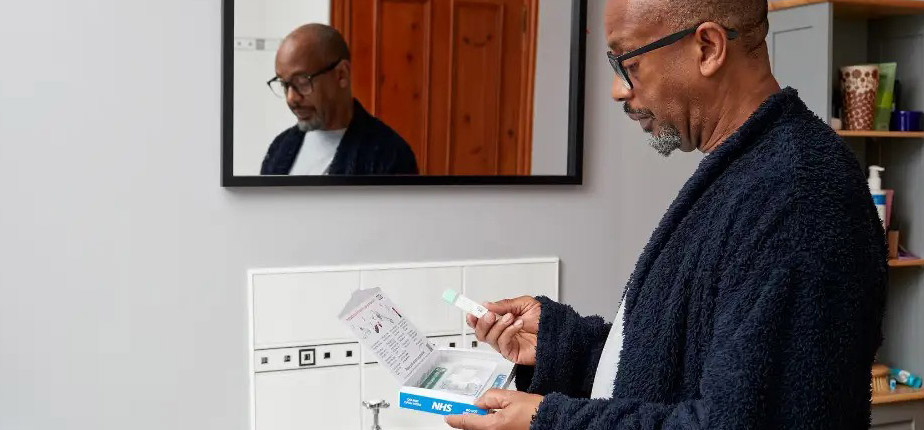
The national bowel screening programme is being expanded to include people aged 50–54 years, as part of an NHS drive to detect cancers at an earlier stage when they are easier to treat. Previously, the screening programme included people aged 54 to 74 (those over 74 could request a kit). By lowering the age to 50, the programme will now include hundreds of thousands more people, who will automatically receive a home test kit every two years by post when they become eligible.
What Does the Bowel Screening Test Involve?
The tests are sent to people by post. The recipient then takes a small sample of their stool (poo), which is placed into a small vial and sent back in prepaid packaging to the NHS for testing. Although people may feel squeamish about taking a stool sample, the kits are easy to use and only require a very small amount for testing. A small stick with a brush-like structure on the end is used to scrape a sample for testing.
The FIT kit checks for blood in the stool sample, which can be a sign of bowel cancer. Participants receive results within 2 to 3 weeks, along with information about further tests if needed. Only about 2 out of 100 people who use the kit will require further testing.
It is estimated that by expanding the scheme to include people aged 50 and above, an additional 850,000 people in England will be eligible each year, potentially saving many lives. Although the test is done in the privacy of people’s own homes, many do not take up the offer. The NHS is urging people to take the potentially life-saving screening test, especially those aged 54–59. Figures show less than 60% uptake compared to over 70% in the 60-74 age range. The programme aims to diagnose bowel cancers earlier. Early diagnosis increases the chances of successful treatment and survival.
Around 44,100 new bowel cancer cases occur annually in the UK, making it the 3rd most common cancer, accounting for 11% of new cases. There were 16,808 deaths from bowel cancer between 2017 and 2019 in the UK (source: Cancer Research UK). Many feel healthy and skip testing, but screening can detect cancers early, improving outcomes before symptoms appear.
Steve Russell, National Director for Vaccinations and Screening at NHS England, said: “Lives are saved when cancers are caught early, and the expansion of the NHS bowel cancer screening programme to those aged 50 will help spot signs of bowel cancer sooner, potentially saving thousands of lives.”
Professor Peter Johnson, National Clinical Director for Cancer at NHS England, said: “Thousands of people in England develop bowel cancer each year, and there are concerns that it is becoming more common among people in their 50s. But what we do know is that the chances of surviving it are very good when it is caught early, which is why the NHS is sending out millions of free bowel cancer screening kits for people to use in the comfort of their own homes. We urge everyone invited to take part.”
If you notice any symptoms of bowel cancer, contact your GP and don’t wait for your screening test. Look out for changes in your bowel habits lasting 3 weeks or more, such as:
Discomfort in your stomach
Blood in your stool
Diarrhoea or constipation for no obvious reason
A feeling of not having emptied your bowels after going to the toilet
Pain in your stomach or bottom
Your stool is loose, pale, or looks greasy.
For more information or advice on bowel cancer screening, call the free helpline at 0800 707 60 60. You can also find further details about the screening programme on the NHS website.
(Photos Credit: CRU/CC)
Rachel Kayani